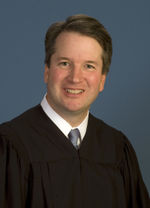Atheist Lawsuits And Restrictions To Religious Freedom
 From Conservapedia
From Conservapedia Atheist organizations in the Western World are often litigious. They often use ligitation to restrict the degree of religious freedom in a society.
The Freedom From Atheism Foundation has a webpage on their website entitled "Ongoing Lawsuits".[1] The American Atheists has a webpage on their website entitled "Legal sucesses".[2] The Center for Inquiry engaged in lawsuits related to faith based initiatives concerning prison ministry.[3][4][5][6]
In June 2014, given the focus of atheist organizations on lawsuits, Sikivu Hutchinson wrote in the Washington Post that atheist organizations generally focus on church/state separation and creationism issues and not the concerns the less affluent African-American population faces.[7] Hutchinson also mentioned that church organizations do offer significant help to poor African-Americans.[7] See also: Atheism and charity and Western atheism and race
Contents
- 1 Madalyn Murray O’Hair, the founder of the American Atheists organization, on filing lawsuits vs. providing a hospital with medical equiptment
- 2 Originalist interpretation of the First Ammendment of the U.S. Constitution
- 3 Newdow v. U.S. Congress
- 4 Religious Liberty Expert Kelly Shackelford Statement on the U.S. Senate’s Confirmation of Brett Kavanaugh to the United States Supreme Court
- 5 Atheist lawsuits against other atheists
- 6 Atheist lawsuits and public relations
- 7 See also
- 8 Notes
Madalyn Murray O’Hair, the founder of the American Atheists organization, on filing lawsuits vs. providing a hospital with medical equiptment[edit]
See also: Atheist hospitals

Neither Madalyn Murray O’Hair nor the American Atheists organization ever built a hospital.
Madalyn Murray O'Hair, the founder of American Atheists organization declared concerning hospitals: "An atheist believes that a hospital should be built instead of a church.".[9]
Neither Madalyn Murray O’Hair nor the American Atheists organization ever built a hospital.
The article My mother: the most hated woman in America: Interview with William J. Murray declares:
| “ | In 1979, William had an idea to help get rid of his mother’s reputation as the most hated woman in America.
He told her of a hospital which desperately needed new equipment. He suggested she buy the equipment and put a plaque on it saying, ‘A gift from Madalyn Murray O’Hair—atheist.’ ‘I told her we’d call a news conference and get the story publicized all over the United States. Then people would say she’s not such a bad old gal after all.’ She fumed. ‘She said, “Why would I want to take perfectly good money and use it to buy hospital equipment? I could use that money to file lawsuits to bar pastors, priests and rabbis from being allowed to go into hospitals.”’[10] |
” |
Taylor Barkley in his article An Atheist’s Perspective on Christian Engagement in the World wrote:
| “ | A Christian believes that a hospital and a church should be built. A Christian believes that deeds must be done and prayers said. A Christian strives for involvement in life and has nothing to fear in death. He wants disease conquered, poverty vanished, and war eliminated and works with Christ to accomplish those goals, knowing that they will be accomplished one day.[11] | ” |
Originalist interpretation of the First Ammendment of the U.S. Constitution[edit]
| “ | To those who cite the First Amendment as reason for excluding God from more and more of our institutions and everyday life, may I just say: The First Amendment of the Constitution was not written to protect the people of this country from religious values; it was written to protect religious values from government tyranny. --- Ronald Reagan | ” |
See also: First Amendment
Originalism is a method of constitutional interpretation that focuses on how a provision of a constitution would have been understood at the time of its ratification.
Liberals/leftist often focus on the "Establishment Clause", arguing that because the federal government cannot endorse or establish a religion, the state must remain neutral, or even hostile towards religion. This position is not supported by the original intent and application of the Constitution. Michael Farris argues that the Establishment Clause should not apply to the states because it is a jurisdictional limit on federal power, rather than a protection of rights incorporated by either the Due Process Clause or Privileges or Immunities Clause of the Fourteenth Amendment.
However, liberals often overlook the clause explicitly allowing for the free exercise of religion, also known as the Free Exercise Clause. Conservatives argue that this clause can be interpreted to allow much more leeway to the majority of religious Americans than liberals currently allow, and that it provides legislators with great flexibility in supporting the ends of Christian faith, as long as all other religious denominations are equally supported. The fact that Congress may pass no law establishing or respecting a particular Christian denomination provides the federal government with the freedom to support a variety of Christian ventures, notably the faith-based initiatives enacted under President Bush.
The extent of First Amendment protections of freedom of speech have been a topic of controversy even within the conservative movement. While all conservatives agree that the First Amendment grants absolute protection to ideas, including so-called hate speech, many argue that it does not protect certain "expressive conduct" like flag-burning and violent video games, a position opposed by former Supreme Court Justice Antonin Scalia, who believes that while flag-burning is reprehensible, the First Amendment does not contain an exception allowing for the government to forbid it. [12] [13]
Newdow v. U.S. Congress[edit]
See also: Newdow v. U.S. Congress
In Newdow v. U.S. Congress, 541 U.S. 1 (2004), the U.S. Supreme Court overturned on standing grounds a challenge to the voluntary recitation in public schools of the Pledge of Allegiance. The plaintiff, a self-described atheist, insisted that the mention of "under God" in the Pledge violated the First Amendment.
By dismissing the case on procedural grounds, the Court deferred to a future case the resolution of the merits of this type of challenge.
Religious Liberty Expert Kelly Shackelford Statement on the U.S. Senate’s Confirmation of Brett Kavanaugh to the United States Supreme Court[edit]
See also: Donald Trump and American atheists and Donald Trump achievements: Religious liberty and LGBT
Brett Kavanaugh is a justice on the U.S. Supreme Court, having been nominated by President Donald Trump and confirmed by the U.S. Senate in 2018, replacing Justice Anthony Kennedy.
A 2018 press release from the First Liberty Law firm:
| “ | As a law firm dedicated to defending religious freedoms, we are thrilled that Judge Kavanaugh has finally been confirmed to the Supreme Court. Judge Kavanaugh has a solid history and commitment to protecting the religious freedoms and First Amendment rights of our citizens and has demonstrated in his many years on the bench a deep respect for the proper role of the judiciary.[14][15] | ” |
Video[edit]
Atheist lawsuits against other atheists[edit]
See: Atheist lawsuits against other atheists
Atheist lawsuits and public relations[edit]
See: Atheist lawsuits and public relations
See also[edit]
- Atheist lawsuits
- Atheists and conflict resolution
- Atheism and intolerance
- Militant atheism
- Atheistic communism and torture
- Atheism and human rights violations
- China and involuntary organ harvesting
- Atheism and repressive prisons
- Atheism and mass murder
- Alliance Defending Freedom
Notes[edit]
- ↑ Ongoing Lawsuits - Legal - Freedom From Religion Foundation
- ↑ Legal sucesses - American Atheists
- ↑ Postal, Leslie (April 20, 2011). Bill asks voters to OK taxpayer funding of religious institutions. Orlando Sentinel.
- ↑ Mazzei, Patricia (April 27, 2011). Blaine amendment repeal passes Florida house. Tampa Bay Times.
- ↑ Center for Inquiry will not appeal adverse decision in Florida lawsuit. CFI (February 8, 2016).
- ↑ Bettis, Kara (February 23, 2016). Atheists drop suit to block Christian prison ministry funding. New Boston Post. Retrieved on May 16, 2016.
- ↑ 7.0 7.1 Atheism has a big race problem that no one’s talking about by Dr. Sikivu Hutchinson, Washington Post June 16, 2014
- ↑ An Atheist’s Perspective on Christian Engagement in the World by Taylor Barkley
- ↑ An Atheist’s Perspective on Christian Engagement in the World by Taylor Barkley
- ↑ My mother: the most hated woman in America: Interview with William J. Murray by Robert Doolan
- ↑ An Atheist’s Perspective on Christian Engagement in the World by Taylor Barkley
- ↑ https://constitutioncenter.org/blog/when-the-supreme-court-ruled-to-allow-american-flag-burning
- ↑ https://www.oyez.org/cases/2010/08-1448
- ↑ Religious Liberty Expert Kelly Shackelford Statement on the U.S. Senate’s Confirmation of Brett Kavanaugh to the United States Supreme Court, Global News Wire
- ↑ Religious Liberty Expert Kelly Shackelford Statement on the U.S. Senate’s Confirmation of Brett Kavanaugh to the United States Supreme Court
Categories: [Atheist Organizations] [Atheism]
↧ Download as ZWI file | Last modified: 02/23/2023 06:37:48 | 41 views
☰ Source: https://www.conservapedia.com/Atheist_lawsuits_and_restrictions_to_religious_freedom | License: CC BY-SA 3.0
 ZWI signed:
ZWI signed:


 KSF
KSF